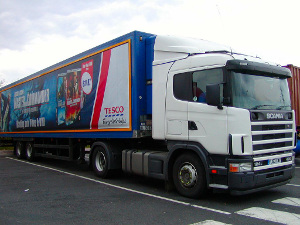 argest retailer, has apparently stopped using waste contractors to pick up and dispose of general rubbish, including unsold food, from its 600 largest supermarkets.
argest retailer, has apparently stopped using waste contractors to pick up and dispose of general rubbish, including unsold food, from its 600 largest supermarkets.Instead, bags of waste are piled into metal wheeled cages lined with clear plastic. These cages are picked up by the same trucks that deliver food to the stores once they have emptied their load.
The trucks drop off the rubbish at a waste centre before returning to Tesco's distribution centres to pick up more groceries and food to start the cycle again.
A Tesco spokeswoman told the Guardian newspaper that the system, which does not involve the smaller vans that make home deliveries to customers, was more environmentally friendly.
"We have recently introduced a new way of managing waste in some of our stores, which will remove 20,000 additional trips a year and reduce our carbon emissions by 4.5 tonnes a year."
The spokeswoman insisted there was no risk to food hygiene: "We have high standards of hygiene and food safety, and we require all vehicles to be inspected and cleared after every trip, with additional cleaning if required, alongside regular deep cleans."
Many supermarkets transport dry waste, such as cardboard or plastic, from stores to recycling centres in empty grocery delivery lorries. The process is called backfilling and saves both money and fuel, so is seen as environmentally friendly.
Only one other supermarket – Sainsbury's – backfills with general waste and under its system bin bags are put into large plastic crates that are washed each time before reuse. A spokesperson said: "We never have waste or recyclate on board our delivery lorries at the same time as products for sale in our stores."
Marks & Spencer backfills its food trucks with food waste, but this is stored in specially designed large cardboard boxes lined with a heavy plastic.
Asda, Morrisons and Waitrose all told the Guardian that they never transport general waste in their food lorries.







